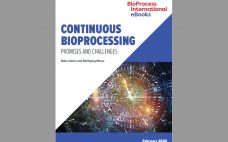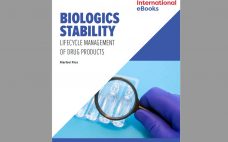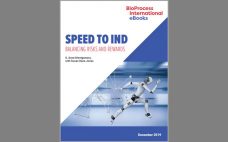Although animal cell culture has dominated the biopharmaceutical industry for some years now, microbial expression remains important for producing proteins that don’t require posttranslational modifications — or only those that prokaryotic microbes can perform. It also offers an affordable option for antibody fragments and gene therapies. Microbes may be less fragile than animal cells, and they do require simpler media, but they present other challenges related to temperature management and oxygen transfer in culture. Wherever practical, bacterial expression is preferred…
eBooks
eBook: Sensor Technologies — Essential Tools for Bioprocessing 4.0
Sensors are essential devices that can be used for most, if not all, typical biopharmaceutical development and manufacturing processes to monitor fundamental process parameters such as flow, temperature, pH, and dissolved oxygen throughout all process stages. As the bioindustry progresses toward automation, digitalization, and other “Manufacturing 4.0” concepts, robust single-use and smart sensors for bioprocess monitoring will be needed. Read this BPI eBook to garner valuable perspectives on both of these types of sensors. Discussions herein focus on smart sensor…
eBook: Peptide Therapies — Small Biomolecules Address Big Health Problems
This crash course in the development of peptide therapies brings together two articles: one on product research and the other on manufacturing and regulatory concerns. In “Fighting Alzheimer’s Disease from Within: A Breakthrough Peptide,” freelance journalist Marc Davis highlights current developments in Alzheimer’s disease treatment, focusing specifically on a peptide approach from Canadian company NervGen. In “Making Peptides Work,” BPI’s senior technical editor adds perspective on developing and manufacturing peptide therapies from the Informa Connect community, with commentary from experts…
eBook: Continuous Bioprocessing — Promises and Challenges
Biotechnological productions are commonly executed as batch processes, especially during downstream processing. Higher titers in fermentations, reductions in operating scale, and the quest for improving product quality all have led to an intensified effort for developing continuous processing. It is forecasted that within the next 10 years, about 50% of all drugs under development will be biopharmaceuticals, making it worthwhile to develop more efficient processes. In this BPI eBook, Babu Halan (project engineer) and Wolfgang Minas (global lead of the…
eBook: Joining Forces — Industry Collaborations Toward BioProcess Success
Companies in the biopharmaceutical industry increasingly are working together to solve the many challenges of product/process development and biomanufacturing. Suppliers seek end-user help in refining technologies; academics and small innovators attract the financing and business acumen of large companies; equal partners share in technological problem-solving; and sponsors engage the development expertise of contract research and manufacturing organizations. Other examples of biopharma industry collaborations abound, too. Citing critical examples from the September 2019 BioProcess International East Conference in Boston, MA, this…
eBook: Viral Vectors for Vaccines — A Virtual Conversation on Production and Analysis
Although today’s vaccines are safer, more effective, and more accessible than they were even 20 years ago, the emergence of new, complex pathogens has exposed limitations in traditional vaccine strategies. Viral vector vaccines (VVVs) hold great promise for confronting those now-intractable pathogens. Combining the best features of live-attenuated and DNA-vaccine approaches, these next-generation prophylactics seek to harness the infectivity of non- or low-immunogenicity viruses to shuttle antigen-encoding DNA from target pathogens into host cells. The resulting transduced cells then initiate…
eBook: Biologics Stability — Lifecycle Management of Drug Products
The biomanufacturing industry’s increasing attention to risk mitigation through quality by design (QbD) and the emergence of complex therapeutic modalities have driven the need for a lifetime-management approach to assuring drug product stability. To that end, industry guidelines have been (or are being) developed to guide the industry toward a “holistic approach” to conducting stability assessments. However, not all methods are stability indicating, and many more industry concerns need to be addressed. This BPI eBook offers perspectives on ICH Q12…
eBook: Speed to IND — Balancing Risk and Reward
With so many biopharmaceuticals obtaining breakthrough or fast-track designations, companies that use accelerated strategies to be first in human studies can be left with significant quality and manufacturing challenges that must be solved later on. Despite regulatory encouragement to create solid design spaces and define parameters according to quality by design (QbD), those may go by the wayside given the pressures of speed. The reward is the investigational new drug (IND) application itself — but if companies lock in subpar…
eBook: Addressing Production Complexities — Strategies for Working with Difficult and Susceptible Proteins
All proteins are complex — but some are more complex than others, particularly when it comes to recombinant protein expression and production in commercial quantities. What works in a research laboratory to make a milligram of pure protein for study won’t necessarily work on a manufacturing floor to make kilogram batches for drug-product formulation. An increasing number of technological options are available, however, from a simple switch in expression host or adding folding steps in downstream processing to special genetic…
BioProcess International 2019 Event Report
The 2019 BioProcess International Conference and Exhibition, held in Boston, MA from 9–12 September, was a testament to the rapid expansion of the biopharmaceutical industry. Nearly 150 speakers chronicled recent developments and continuing challenges in upstream production, downstream processing, drug product manufacturing, and emerging therapies production. And with more than 150 poster presentations and over 200 companies participating, the BPI exhibit hall never better embodied the industry’s efforts to support increasingly diverse but related audiences. In this event report, BioProcess…










